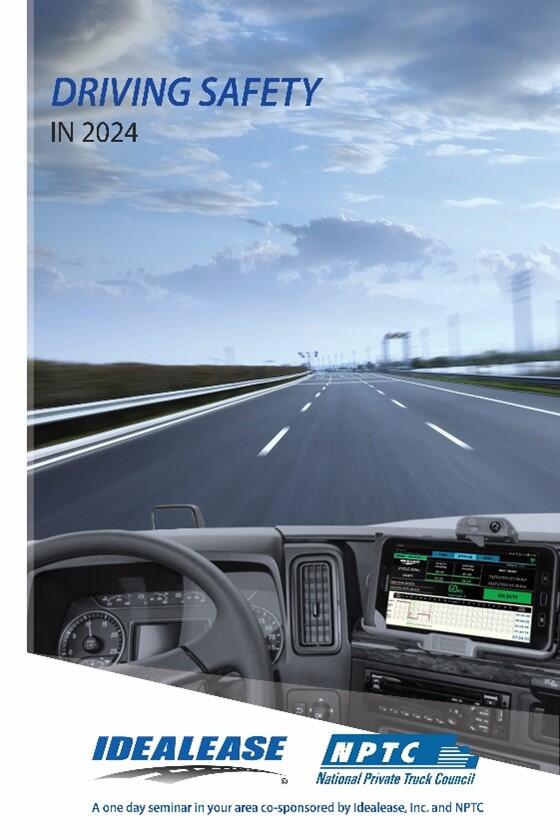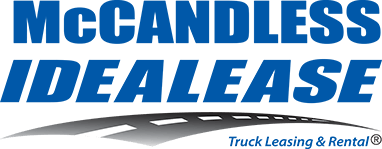Different Levels of Commercial Vehicle Safety Alliance (CVSA) Inspections
Check out the latest Idealease Safety Bulletin for the most up-to-date information on safety regulations and guidelines. Learn about CVSA inspections and get tips for inspection preparation. Subscribe to receive all future bulletins.
Roadside inspections are common for commercial motor vehicle (CMV) drivers throughout the year, but they are particularly significant during the annual Commercial Vehicle Safety Alliance (CVSA) International Roadcheck, which is scheduled for May 14-16th this year in North America. The inspections during Roadcheck will focus on the presence or use of controlled substances and alcohol among drivers, as well as tractor protection and anti-bleed back systems. However, there are eight CVSA inspections every carrier and driver should be familiar with, not just the Roadcheck event.

There are various types of inspections for commercial vehicles and drivers. These inspections can cover the driver, the vehicle, or both. They are conducted to ensure safety and compliance with regulations. Let's take a look at each type:
1. Comprehensive Driver and Vehicle Inspection: This inspection is a thorough check that lasts around 45-60 minutes. It includes verification of the driver's documents, such as the commercial driver’s license (CDL) and medical card. It also examines various vehicle components like brakes, lights, tires, and cargo securement.
2. Walk-around Inspection: This inspection is similar to the comprehensive inspection, but it doesn't include components that require the inspector to go beneath the vehicle. It usually takes about 30 minutes to complete.
3. Driver-Only Inspection: This inspection focuses solely on the driver's documentation, including CDL, medical card, hours of service, and annual inspection records.
4. Special Inspections: These are one-time examinations conducted to investigate a specific item or trend.
5. Vehicle-Only Inspection: This inspection is conducted without the presence of the driver, usually at the carrier's premises during an on-site visit. It closely resembles a comprehensive vehicle inspection and serves as a valid annual inspection.
6. Radioactive Materials Inspection: This inspection is conducted on select shipments of radioactive materials and adheres to a higher standard than comprehensive inspections. Any brake issues found can lead to an out-of-service violation.
7. Jurisdictional Mandated Commercial Vehicle Inspection: This inspection is specific to certain types of vehicles, such as school buses, limousines, and taxis.
8. North American Standard Electronic Inspection: This inspection is conducted wirelessly while the vehicle is in motion, without direct interaction with an enforcement officer. It must fulfill the data exchange criteria outlined in the CVSA North American Standard Level VIII Electronic Inspection definition.
Preparation is crucial. Being aware of inspection requirements and ensuring drivers are equipped to handle inspections professionally and efficiently can enhance your company's performance and reputation within the industry. Adhering to safety protocols minimizes inspections, maintains a favorable safety record, and avoids scrutiny from regulatory bodies like the Federal Motor Carrier Safety Administration (FMCSA).
Commercial Vehicle Safety Alliance (CVSA) Driver Tip Sheet
CVSA published this tip sheet for carriers and drivers in preparation for this year’s Roadcheck that you can print off as a handout for your drivers:
https://www.cvsa.org/wp-content/uploads/NASI-Program-Brochure.pdf
Question of the Week
Question: How long must I retain documentation of my driver's roadside inspection?
Answer: Motor carriers are required to maintain copies of all roadside inspections for a period of 12 months. Drivers must submit the inspection report to the motor carrier within 24 hours, either in person or by mail if they are not returning to the terminal. In cases where violations are found, they must be rectified within 15 days, with the inspection form signed and certified to confirm completion of repairs before being sent back to the state of inspection.
Guidelines for Optimal Roadside Inspection Practices:
1. Provide drivers with comprehensive training on how to conduct thorough pre-trip inspections.
2. Regularly review your Compliance, Safety, Accountability (CSA) scores by entering your DOT number or name on the www.ai.fmcsa.dot.gov website.
3. Cross-reference driver inspections with those on file, and address any discrepancies promptly. Investigate drivers who fail to submit inspection reports.
4. Utilize the "Carrier History" tab in the Tools/Resource section of your homepage to monitor the frequency of inspections and identify any trends of increase or decrease.
5. Collaborate with your maintenance provider to review vehicle inspections and violations, aiming to mitigate future infractions.
6. Keep copies of inspection reports in the tractor and trailer files, including any associated repair orders in the case of violations.
7. Analyze roadside inspection data, including dates, times, and locations, to verify compliance with drivers' hours of service documentation and identify any potential falsifications.
8. Train drivers on effective strategies to successfully navigate roadside inspections and conduct themselves professionally during inspections.
9. Ensure that vehicles are kept clean and well-maintained to avoid attracting unnecessary inspection attention.
10. Inform drivers that moving violations can trigger roadside inspections.
11. Consider implementing incentives for drivers who pass inspections successfully, fostering a culture of compliance and safety awareness.
National Work Zone Awareness Week April 15-19th
As we enter the season of work zones, it's important to keep in mind that each year, around 600 people lose their lives in roadway work zones. Sadly, about 90 workers also succumb to accidents, often involving vehicles entering marked-off construction areas. Therefore, staying focused and eliminating distractions is crucial for drivers as they approach and navigate through these work zones.
Fortunately, National Work Zone Awareness Week (NWZAW) is an annual spring campaign that urges safe driving through highway work zones and construction sites. The primary message is for drivers to exercise extra caution in these zones. So let's pledge to be more vigilant and take responsibility for our actions to keep ourselves and workers safe. For more information, please visit the links below:

Registration Now Open for the 2024 Idealease/NPTC Safety Seminars!
Driving Safety in 2024
Idealease and the National Private Truck Council (NPTC) are excited to announce the opening of registration for the 2024 Safety Seminars. These one-day seminars will focus on crucial topics such as safety data analysis, basic safety and compliance, regulation changes, and CSA.
Who Can Attend: These seminars are open to all Idealease customers, potential customers, and NPTC members, and are provided at no charge.
Seminar Highlights:
- Gain insights into safety practices and compliance regulations.
- Learn about the latest advancements in safety technology.
- Understand CSA (Compliance, Safety, Accountability) and its impact on your operations.
Why Attend: Whether you're a novice or experienced transportation professional, these seminars offer valuable information to enhance your safety practices.
Registration Details: Seminars are currently available for registration, with venues secured for the following locations:
Spring 2024
- 4/10/24: Sun Prairie, WI
- 4/18/24: Frankfort, KY
- 5/9/24: Tampa, FL
- 5/21/24: Portland, OR
- 5/23/24: Santa Rosa, CA
Fall 2024
- 10/1/24: Eugene, OR
- 10/3/24: San Leandro, CA
- 10/9/24: Baltimore, MD
Note: If you don't see a seminar in your area listed yet, don't worry. Registration availability will be updated weekly as venues are secured. Keep an eye on this bulletin for the latest updates.
To register for an upcoming seminar in 2024, click on the following link: Safety Seminar Registration. Don't miss out on this opportunity to enhance your safety knowledge and practices in 2024. Register today!
*The Idealease Safety Bulletin is provided for Idealease locations and their customers and is not to be construed as a complete or exhaustive source of compliance or safety information. The Idealease Safety Bulletin is advisory in nature and does not warrant, guarantee, or otherwise certify compliance with laws, regulations, requirements, or guidelines of any local, state, or Federal agency and/or governing body, or industry standards.
